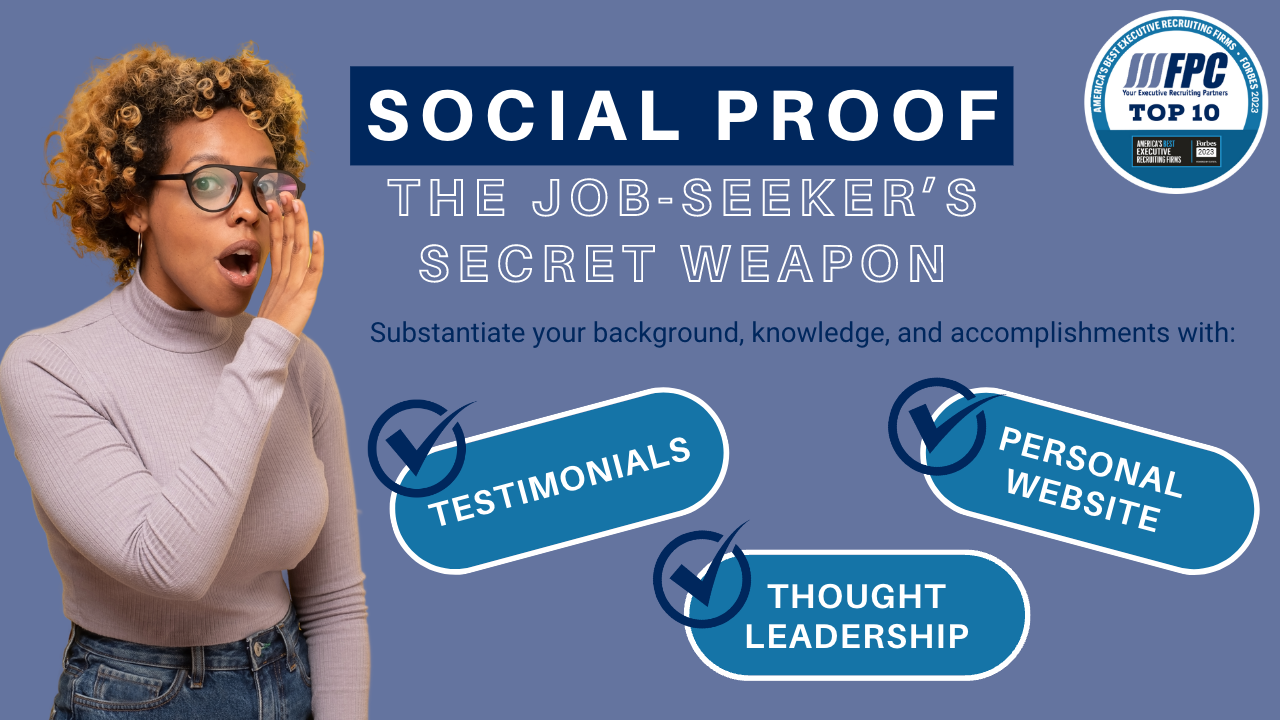Social Proof: The Job-Seeker’s Secret Weapon
Employers
Sure, your resume touts your amazing accomplishments and highlights your impressive skill sets. And why shouldn’t it? You are in full control of every word of your personal narrative. You say you’re an excellent communicator, and you increased sales by 500%, and you know everything there is to know about best practices in your field – but where is the corroborating evidence?
Employers understand that your resume is a self-reported document of your experience and achievements; and, as such, they take a lot of what they read with a grain of salt.
Would you like to add a little muscle to your candidacy? Then support your claims with social proof.
Here are three proven ways to substantiate your background, knowledge, and accomplishments:
Testimonials
I’d be willing to wager that you occasionally (or often) check public reviews before purchasing a product or service. The company’s marketing materials, website, and packaging all state how terrific the product is – but is that enough? Can they be trusted? After all, you don’t expect a company to highlight its drawbacks and post on social media about their 1-star ratings.
Reviews, testimonials, and recommendations provide social proof that consumers need to feel confident in their purchasing decisions. Employers are no different. They want to be assured that they are making the right hiring decision by validating the claims you make on your resume. After all, if you remain with the company for four years (the average tenure in the U.S.), your salary and benefits could cost the employer hundreds of thousands of dollars – or more. With a purchase this size, employers want more assurance than just your word that hiring you will be a good investment.
One great way to generate social proof and help put a recruiter’s mind at ease is through recommendations. In the old days, job candidates typically would ask their former employers to write letters of recommendation. And while this is still done occasionally, it is far more common to provide recommendations on your public profile on LinkedIn.
Job candidates can create a strong impression with social proof by securing authentic, specific recommendations for their LinkedIn profiles. And these recommendations do not need to come from direct supervisors only. They can also include colleagues, vendors, happy clients, outside partners, direct reports, and anyone else who can attest to your value, achievements, and character.
Pro Tip: When asking for someone to write a LinkedIn recommendation for you, provide them with talking points that support your messaging. Don’t ask for a generic recommendation; instead make sure they cite examples of your work that align with the content you are using on your resume, on your LinkedIn profile, and in your interviews.
Thought Leadership
Do you want a prospective employer to believe that you are an expert in your industry? Then prove it. Use LinkedIn to post content that demonstrates your thought leadership on your subject. Find industry articles that discuss current issues in your field, and then post them with insightful captions that convey your opinion on the matter.
Want to kick it up a notch? Instead of an ordinary post, compose a long-form article to publish on LinkedIn. This gives you an opportunity to flex your muscles and demonstrate an expert-level knowledge of the finer points of your industry. Your writing backs up claims made on your resume and provides a tangible example of your thought leadership.
Additionally, you can use LinkedIn to demonstrate your contribution to current conversations in your field. Making insightful comments to others’ posts, joining and posting in professional groups, and participating in LinkedIn events and training programs all elevate your standing in your industry.
Personal Website
While LinkedIn is a terrific platform to generate social proof of your value and achievements, you can go above and beyond this social media network to make a strong impression. By setting up your own website, you are able to create an environment that enables you to dive much deeper into your expertise.
It is relatively easy and inexpensive to secure your own URL (see if yourname.com is available) and use online tools to create a simple website. You can use your site to publish many of the same things you did on LinkedIn, including your resume, recommendations, and articles.
You can also use the website to publish more detailed examples of your achievements, including case studies, projects, photos of your work, and any other relevant materials. In addition, you can secure your own personal email address: firstname@yourname.com, which provides additional credibility.
Next Steps
As you begin to lay the foundation to create social proof, it’s time to reach out to your recruiter to help guide you in your personal marketing plan. FPC National has been helping job seekers achieve their career goals since 1959. With 60+ offices across the nation, we have the experience, knowledge, and network to lead you to success. Take a moment to find your recruiter here.

